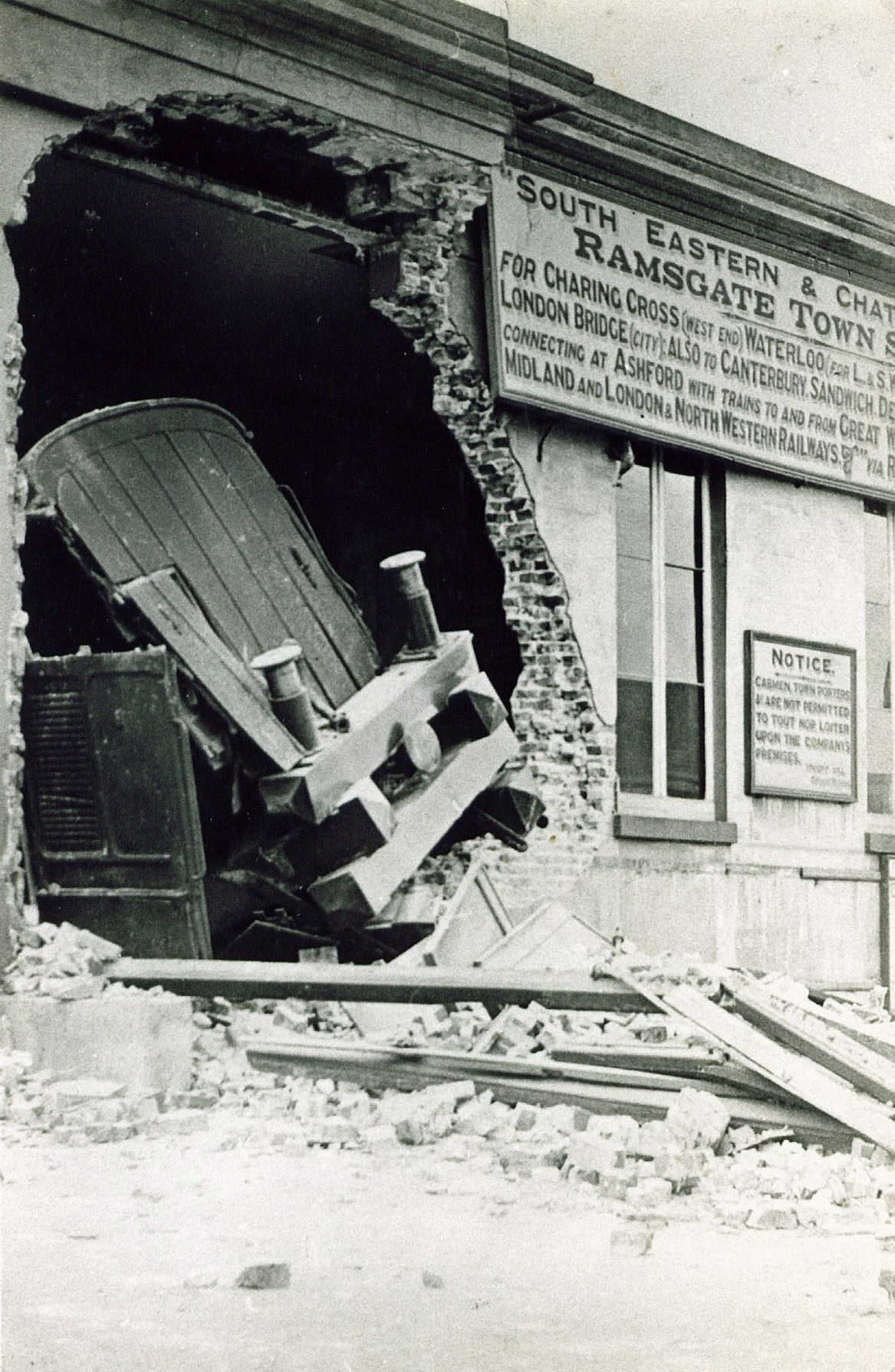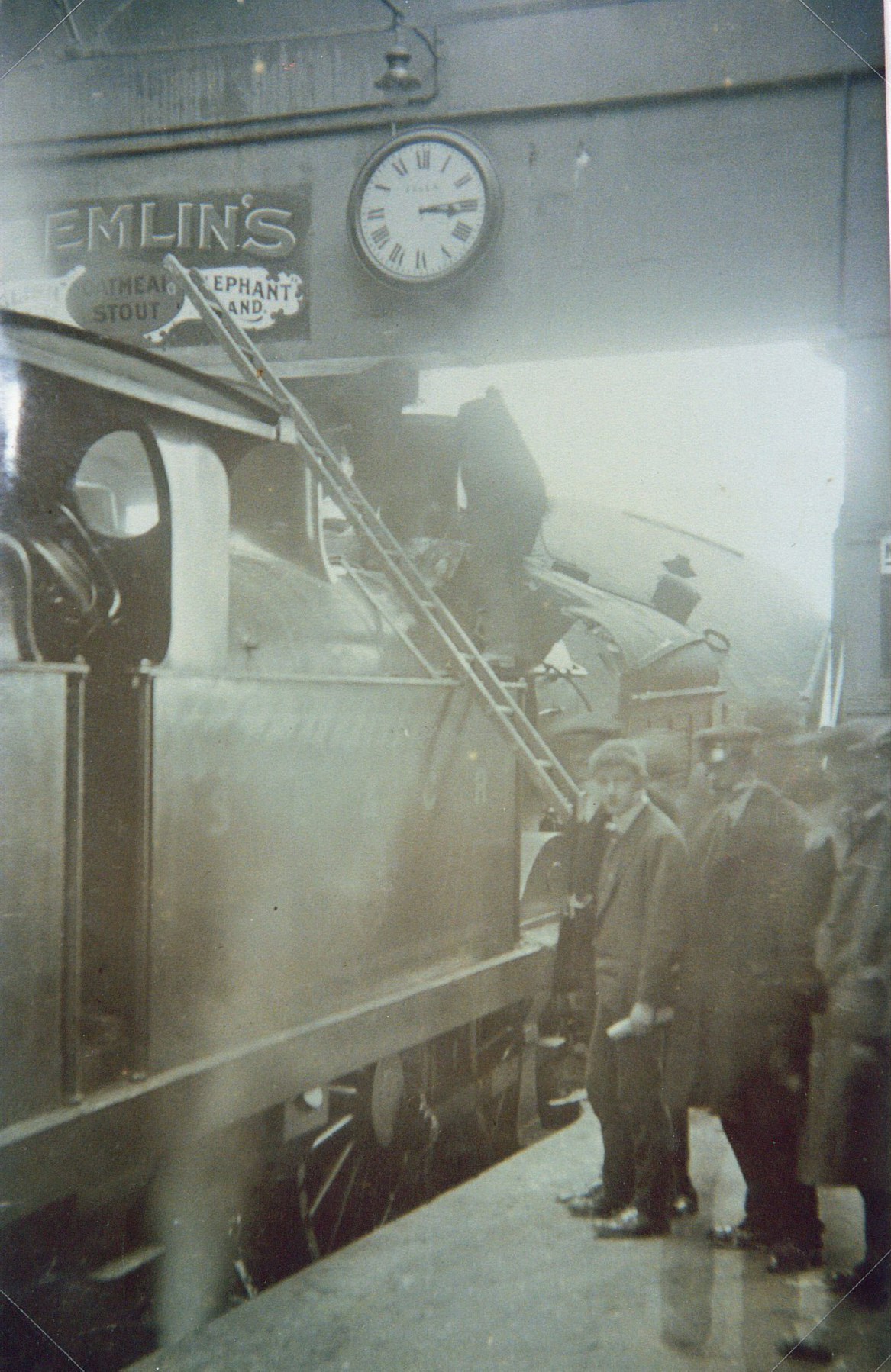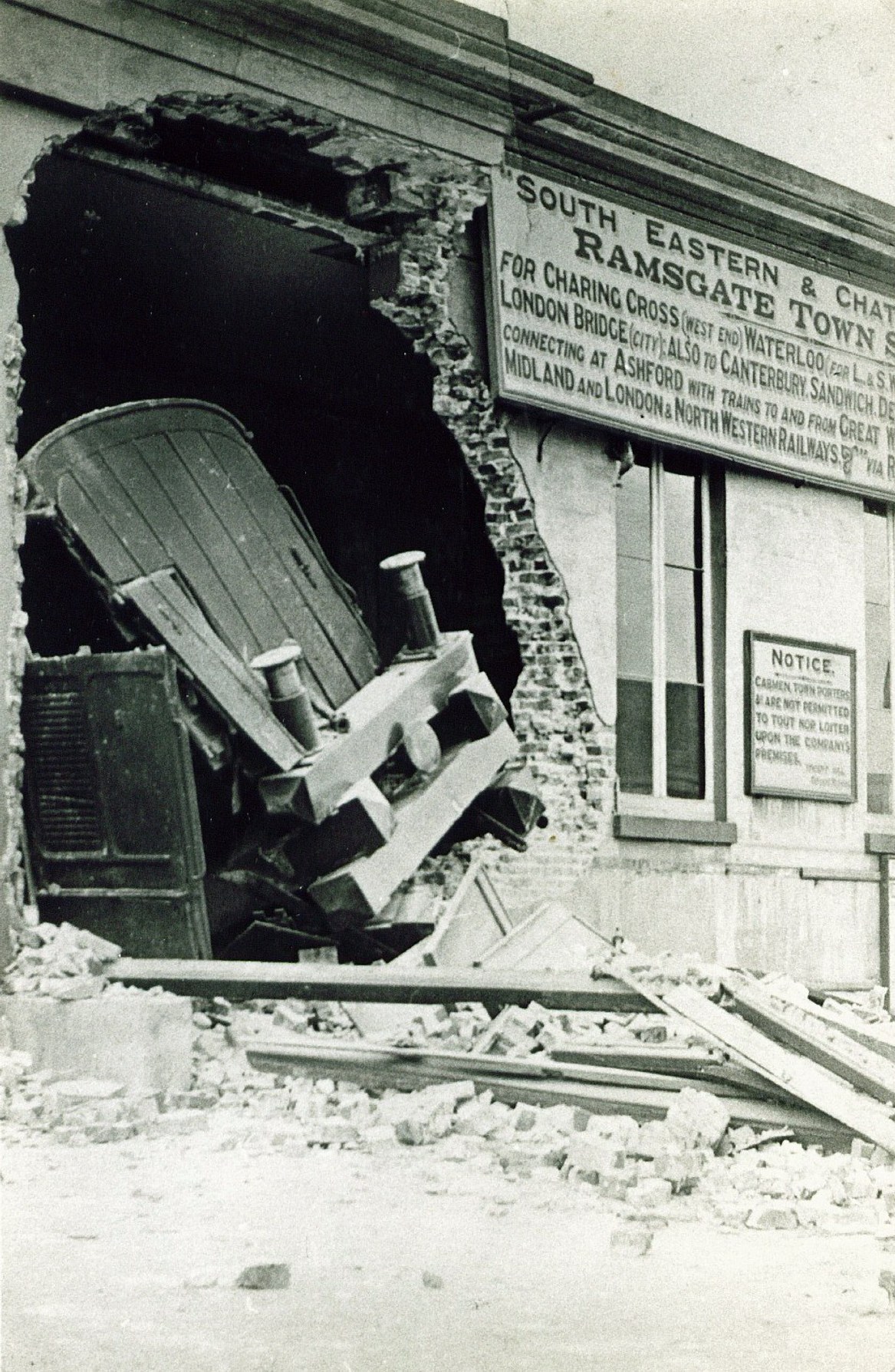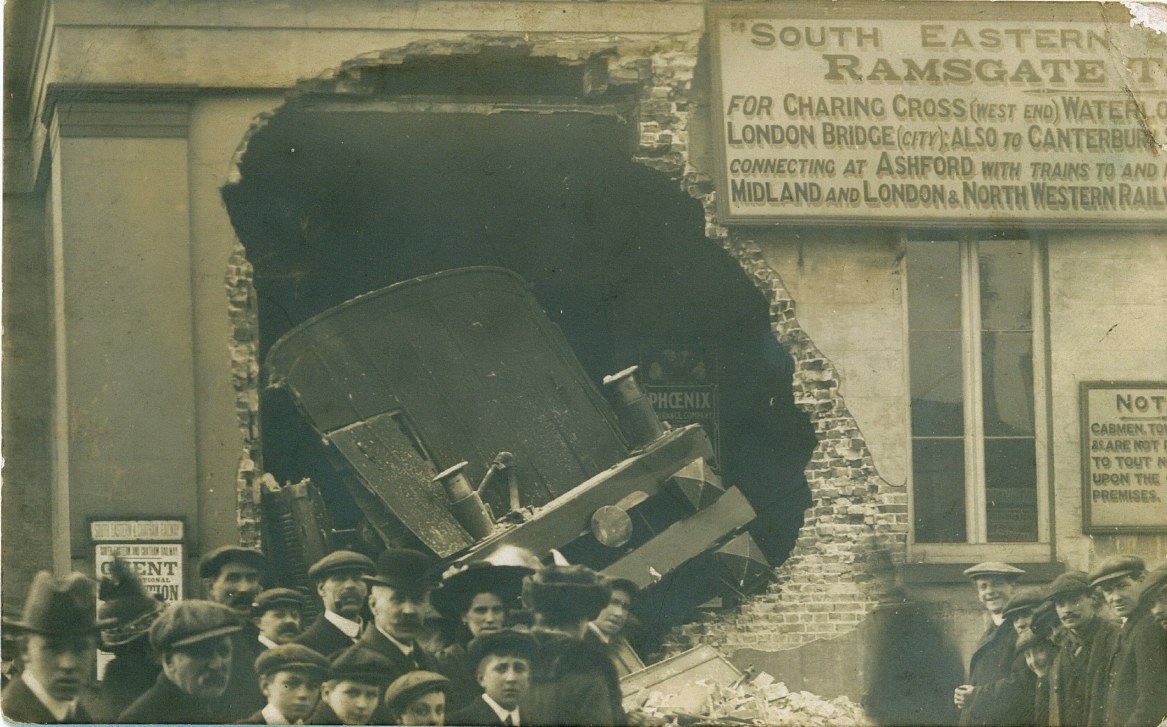Ramsgate all Change | Click here to buy the book or look at our other books about Ramsgate and the surrounding area.
Ramsgate all Change
Once again I haven't tried to make the web pages look the same as the pages of the book but just published some of the text and pictures from the book here.
RAMSGATE TOWN STATION 11, MARCH. 1913
 The most serious mishap which occurred on the railway at Ramsgate for over twenty years took place at the Ramsgate Town Station on a Tuesday afternoon, when an approaching train dashed into a stationary brake van standing at the end of one of the platforms precipitating the van across the platform and through the main entrance to the station premises.
The most serious mishap which occurred on the railway at Ramsgate for over twenty years took place at the Ramsgate Town Station on a Tuesday afternoon, when an approaching train dashed into a stationary brake van standing at the end of one of the platforms precipitating the van across the platform and through the main entrance to the station premises.As a direct result of the accident a portion of the station premises was wrecked, and ten persons complained of having received injuries. The Ramsgate Town Station (as was also the case at the Harbour Station) is a terminus, and the pull-up of trains had to be gauged within a few yards by the drivers of trains.
The train which caused the trouble was the London train, which left Margate at 1.55 and was due at Ramsgate at 2.09. It was stated that the driver became acquainted with the fact that there was something wrong with the brake before the train arrived at the station, but he was quite unable to bring up, and the consequences were serious. When the engine drawing the train arrived at Ramsgate there was an empty brake van standing at the end of the platform and just inside the station doors. Buffers of a very heavy type were at the end of the line. The engine plunged into the van with a terrible crash, sending the van forward against the buffers, which were carried away like matchwood, and the van itself was hurled through the doorway of the station buildings. Brickwork and woodwork were sent flying, and the force of the impact caused a cloud of dust to rise from the debris for a few moments obscuring the whole of the surroundings. It was not known for a few moments how many people were under the broken woodwork and ironwork. A railway employee residing a mile away from the scene heard the noise of the crash and thought it came from vessels firing near Margate.
 A great hole was torn in the wall of the station, and the van, which was carried over the buffers, was found afterwards with the engine partly embedded in it. There was naturally a scene of great excitement and anxiety, and the railway officials had some difficulty in satisfying the fears of the passengers and others who hurried to the spot. It looked almost as though an explosion had occurred.
A great hole was torn in the wall of the station, and the van, which was carried over the buffers, was found afterwards with the engine partly embedded in it. There was naturally a scene of great excitement and anxiety, and the railway officials had some difficulty in satisfying the fears of the passengers and others who hurried to the spot. It looked almost as though an explosion had occurred.Many of the passengers travelling by the train were shaken, but no very serious casualties were recorded amongst them, and the most severely injured person was Miss Foad, who, with her younger sister, Dorothy, had come to meet another sister, by a train due at 2.13 from Sandwich. She reached the top of the steps at the entrance to the station at the precise moment that the accident happened, and was partly buried beneath the falling brickwork. When extricated she was semi-conscious, but those who rendered first aid were amazed to find that apparently no bones were broken, although her hatpin was snapped and her clothing was badly torn. The younger girl, Dorothy, also escaped miraculously. She entered the station a few seconds before her sister and “it seemed,” said a spectator, “that she actually emerged from the wreckage. Her sister must have pushed her out of the way in the nick of time.” The child's only injury was a bruised knee.
The list of injured included:-
Miss Winnie Foad, aged 19, 60, Plains of Waterloo, Ramsgate, severe skin abrasions and shock.
Mr. George Martin Price, 31, Duncan Road, a passenger, slight injury to hand, mouth and suffering from shock.
Mrs. Knight, Northdown Road, Cliftonville, Margate, a passenger, suffering from shock.
Mrs. Talbot, Rayleigh, Brighton Road, Purley, a passenger, suffering from shock and injury to the nose.

Eight other passengers complained of shock and slight injuries and the railway officials took their names. These were cases that did not appear to require medical attention.
The train was driven by James Woodward, of Victoria Road, Ramsgate, and was accompanied by fireman W. Perry, also of Ramsgate. Both men stuck to their posts when the crash took place, but neither was injured.
The services of the local railway ambulance corps were of great value, but fortunately there were no really serious injuries and the accident appeared to be much more alarming than it actually was.
The shed gang from the local station was immediately requisitioned and in a few minutes, men were at work with axes and saws cutting away the debris, and making sure that no one was imprisoned amongst the wreckage. A spectator, who saw the girl Foad removed, remarked upon the fact that although immediately after the accident she was believed to have been killed, her injuries were so slight that half an hour afterwards she was smiling at those around her. The shock was the most serious part of the injuries in her case as well as in most of the others.
The engine which had plunged into the van was subsequently drawn back into the station. Later in the afternoon another engine was brought into use as a tug, and with the aid of a huge chain as a tow line the greater part of the wreckage was drawn away from the gaping hole in the wall.
An immense crowd assembled in the space of a few minutes, and the police were called in to assist the railway officials to keep the people out of danger.
The girl Foad was extricated from the wreckage by Corporal Rose (Town Division St. John Ambulance Brigade), O. Fenrn (Railway Ambulance), W. Larkins, J. Towner (an outside' porter), a man named Chambers, and others.
Miss Foad was assisted to the waiting room, where she was examined by Dr. Archibald and on the arrival of her sister from Sandwich she was conveyed to her home in a cab.
Driver Woodward, who was in charge of the train had a long record of service with the Company. He had been a driver for twenty years.
 By Wednesday morning, the staff gang worked practically all night, the lines were cleared and all wreckage removed. The work of rebuilding the end of the station premises was then commenced and it was found necessary to remove a great deal of the brickwork which appeared to be sound, but which had been badly shaken.
By Wednesday morning, the staff gang worked practically all night, the lines were cleared and all wreckage removed. The work of rebuilding the end of the station premises was then commenced and it was found necessary to remove a great deal of the brickwork which appeared to be sound, but which had been badly shaken.